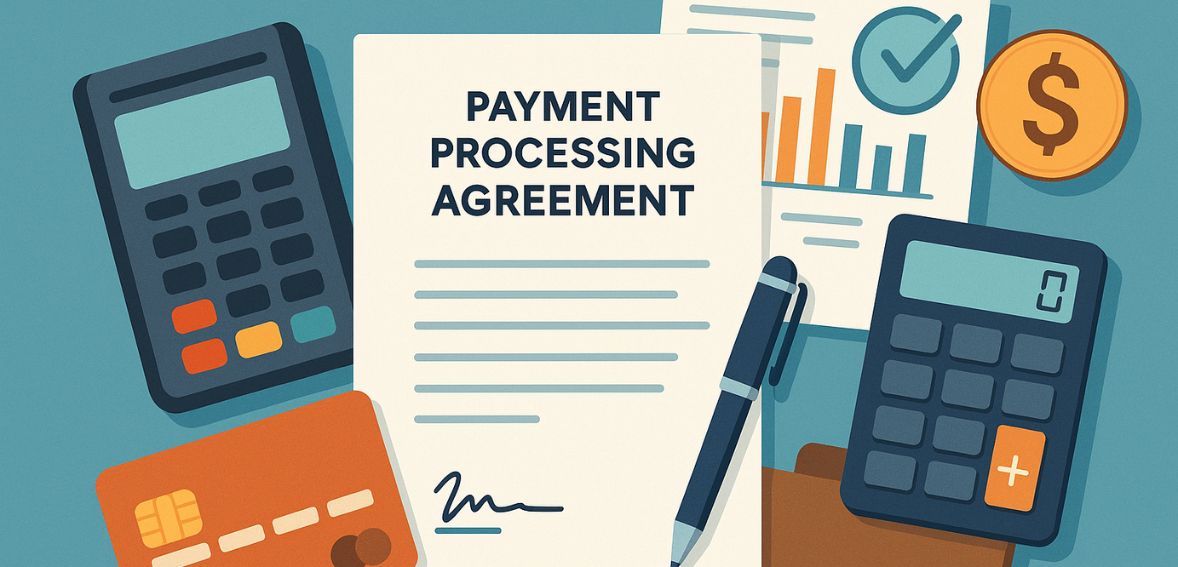
By alphacardprocess July 24, 2025
Understanding the significance of the Fine Print, Payment processing agreements are fundamental contracts that specify how companies will manage every transaction that passes through their systems. These documents may appear simple at first glance, but hidden among their numerous clauses are terms that have the potential to greatly impact your operational control, flexibility, and profitability.
The problem for the majority of merchants is that these contracts aren’t always drafted with their long-term interests in mind. It is difficult to compare processors on an equal basis because many of them are riddled with ambiguous language, automatically renewing clauses, exorbitant early termination fees, hidden surcharges, and confusing pricing models.
As the demand for digital payments increases, so does the importance of aligning with a payment processor focused on simplifying transactions with clear, sustainable, and business-friendly terms. Knowing what to look for—and what to avoid—can make all the difference in protecting your bottom line and scaling your business successfully.
The Illusion of Simplicity

The initial terms of many payment processing agreements are simple, even friendly. They may offer exclusive promotional terms, low rates, or simple onboarding. However, behind those attractive curtains, merchants are frequently caught off guard by complex fee structures, commitment clauses, and price adjustments. Teaser rates, which are incredibly low transaction fees that only apply to a particular kind of card or customer, are one of the most prevalent scams.
You might find that your effective rate is significantly higher than stated once your real-world transactions start. Additionally, some agreements include services like analytics dashboards and loyalty programs that you may never use, bundling them into your monthly fees. These seemingly “value-added” services can add unnecessary weight to your cost structure.
Automatic Renewals and Tricky Termination Clauses

The auto-renewal clause is one of the riskiest features in contracts for payment processing. These clauses are frequently written so that the merchant is still obligated to the terms of the contract unless they provide written notice of cancellation well in advance of the term’s expiration, sometimes up to 90 days beforehand. If you miss that window, you might be stuck there for a year or longer.
Early termination fees (ETFs) can be substantial and non-negotiable, even if you wish to cancel after the original term. Certain contracts even contain liquidated damages clauses, which can result in expenses exceeding thousands of dollars since they determine your penalty by the processor’s estimated lost revenue. Business owners should carefully review termination language and ask for changes to such terms to avoid falling into this trap.
Opaque Pricing Models and Fee Inflation
There are several models for pricing in payment processing, but not all of them benefit the merchant in the same way. Although flat-rate pricing may seem simple, it could lead to overpayment if your company accepts a lot of low-cost debit cards. Although it takes more work to monitor and understand, interchange-plus pricing is frequently more transparent.
Certain providers employ tiered pricing, classifying transactions into nebulous “qualified,” “mid-qualified,” and “non-qualified” buckets—categories that are subject to sudden changes. Even worse, certain agreements permit processors to increase fees with little warning or to employ “pass-through” fees, which may boost the processor’s margins while apparently reflecting increases from banks or card networks. These cost increases have the potential to subtly reduce your profitability over time.
Lengthy Commitments and Exit Restrictions
Some contracts bind merchants to exclusive relationships for extended periods of time—three to five years is not unusual—in addition to the high termination costs. You might not have much of a choice without facing consequences if service quality deteriorates or your company’s requirements change during that time.
Additionally, some processors place technical or procedural hurdles in your way, such as retaining control of equipment, withholding settlement funds, or creating vague “breach of agreement” conditions that enable them to cancel your account without warning. This lack of mutual flexibility places the merchant at a significant disadvantage and creates ongoing dependency that may be hard to escape.
The Importance of Clear Communication Channels

The part of payment processing agreements that specifies how and when the provider and the merchant communicate is another frequently disregarded feature. For example, does your processor need to tell you directly if they decide to increase your monthly fees, or can they just post the change online? How are you informed in the event of a compliance issue, and how long does it take to fix?
Merchants are exposed to last-minute problems and are not given the chance to address issues before they escalate into lost revenue or service interruptions when contracts lack clarity in these areas. Give preference to processors who guarantee openness and incorporate communication into the service model, not only during onboarding but also throughout the relationship.
Reading Between the Lines of Equipment Leases

A lot of payment processors include “free” terminals or point-of-sale systems in their contracts. However, those gadgets frequently have long-term leases that are distinct from your primary contract. Over time, these leases might force you to pay much more than the device’s market value, and you might be left with incompatible hardware if you decide to switch processors.
Even worse, some processors retain ownership of the equipment and charge return or replacement fees. Always ask for a full breakdown of equipment-related costs and make sure they are part of the main agreement—or better yet, purchase your hardware outright.
Understanding Reserve Requirements
Certain processors include provisions that allow them to create a reserve account, which is essentially holding a portion of your money as security. Increased chargebacks, risks associated with your business model, or an arbitrary assessment of your financial situation could all cause this.
Contracts that grant processors complete discretion with little justification can be risky, even though reserves are not intrinsically unfair. Your daily liquidity may be impacted by their ability to hold sizable amounts of working capital with little warning or explicit release schedules. If your processor has reserve clauses, make sure the terms outline how and when reserves will be released as, well as the circumstances under which they are created.
Evaluating Exit Clauses and Auto-Renewals Carefully

The fine print related to termination clauses and auto-renewals is one of the least talked about but most damaging elements of a payment processing agreement. When they learn that terminating a contract early could result in significant cancellation fees, which can occasionally equal the cost of the entire contract period, many business owners are taken by surprise.
Others are not aware that if they don’t cancel their agreement within a specific window, usually 30 to 90 days before the anniversary date, it will automatically renew for another full term. Many agreements contain these mechanisms, and they are frequently written in ways that make them difficult to identify. Because of this, it’s crucial to read and understand all of the terms related to the length of the contract and its termination.
Ask for clarification or suggest changes if anything seems vague or constraining. It is much simpler to negotiate better terms up front than to try to contest them after you have signed. Companies should always budget for flexibility, and if the processor is no longer meeting your needs, a good agreement will allow you to leave without incurring financial penalties. For startups, seasonal businesses, and quickly expanding operations that might need to make quick adjustments, flexibility is especially important.
Red Flags to Watch in a Payment Processing Agreement
- Early Termination Fees: The processor is not sure you’ll want to stay if they demand hefty penalties for ending the contract early.
- Auto-Renewal Traps: You may be locked into a contract for years without warning if it renews covertly and without a clear opt-out window.
- Vague Fee Structures: Keep an eye out for terms that allow them to raise rates abruptly, such as “subject to change” or “market-based adjustments.”
- Non-Cancelable Equipment Leases: Contracts that combine hardware and non-cancelable leases should be avoided, as you may still be responsible for payments even if you change providers.
- Lack of Chargeback Transparency: Expect difficulties when disputes emerge if chargeback procedures and related fees are not well defined.
- Uncertain Support Policies: You’ll probably be on your own when there are technical difficulties if the contract makes no mention of customer service availability or accountability.
- Bundled Value-Add Services You Didn’t Ask For: Features like PCI compliance tools or fraud protection might be mandatory—at an extra cost.
Conclusion: Building Long-Term Processing Relationships Wisely
Processing payments is an essential part of your cash flow and customer experience; it’s not just a back-end task. While fast onboarding and flashy features may be tempting, the true value lies in the terms you agree to when you sign. Examine each clause carefully, paying particular attention to those relating to service commitments, early termination, fee structures, and contract length.
Inquire, object to vague or biased language, and ensure that your processor sees you as a collaborator rather than merely a source of transactions. You can set up your company for long-term success and financial stability in the constantly changing payment ecosystem by putting an emphasis on support, flexibility, and clarity.